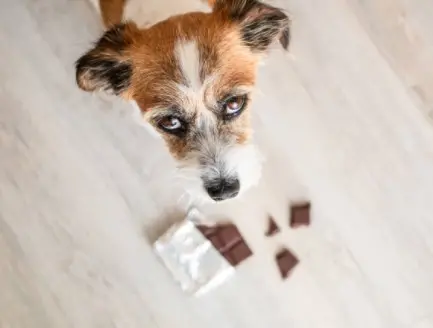Valentine’s Day is meant for sharing expressions of love and devotion, and while a box of gourmet chocolate hearts or lip-shaped candies say “I love you” to a significant other, friend, or family member, they can be the very dangerous for cats and dogs—especially if they include xylitol.
Chocolate ingestion ranks as number one on the Top Toxin list for dogs at the Pet Poison Helpline, a national 24/7/365 animal poison control center. Xylitol, which is a popular sugar substitute in many candies and baked goods, is rising fast as the fourth most common call. Learn how to identify potential holiday hazards, recognize toxicity signs, and respond to a known or suspected ingestion in this educational Valentine from your friends at UrgentVet.

Chocolate toxicity in pets
Chocolate contains pet-toxic chemical compounds known as methylxanthines—specifically, caffeine and theobromine. While dogs are more likely than cats to consume large amounts of chocolate, both species are sensitive to these stimulant ingredients, and can experience dangerous cardiac and nervous system effects.
Most dangerous chocolates for pets
Because chocolate products contain a wide range of cocoa, not all chocolate ingestion leads to toxicity. In general, dark and bitter chocolate (e.g., cocoa powder, baking chocolate) contains higher methylxanthine levels than sweet or milk chocolate. White chocolate is not considered dangerous, but should be avoided.
While keeping all chocolate Valentine candies out of your pet’s reach is important, you must also keep pets out of the kitchen or pantry during any holiday baking, prevent their access to trash cans where they may find wrappers or containers, and store all hazardous ingredients in closed pet-proof containers.

Chocolate toxicity signs in pets
Chocolate toxicosis signs do not typically become apparent until around 6 to 12 hours after ingestion. However, if you witness your pet’s chocolate consumption, do not wait until signs appear—immediately contact your nearest UrgentVet for recommendations and guidance.
If your pet demonstrates the following gastrointestinal, heart, or nervous system-related signs, they may have ingested chocolate.
- Rapid heart rate
- Panting
- Restlessness or anxious behavior
- Increased thirst and urination
- Enlarged abdomen
- Vomiting
- Diarrhea
- Loss of coordination
- Tremors
- Seizures — If your pet has experienced a seizure or is actively seizing, immediately contact your nearest veterinary emergency facility. If you’re uncertain where that is, contact UrgentVet.
Chocolate toxicity treatment and prognosis in pets
Without treatment, toxic metabolites will continue to circulate in your pet’s body, persistently stimulating the cardiovascular and nervous systems, and prolonging and potentially worsening their suffering. If your pet has also ingested candy wrappers, these can block their intestine, and require surgical removal.
With rapid stabilization, decontamination treatment, and supportive care, pets with chocolate toxicosis can make a full recovery, although signs may persist up to 72 hours in severe cases.
Xylitol toxicity in dogs
Xylitol is a sugar alcohol that causes dangerously low blood sugar and acute (i.e., sudden) liver failure in dogs. Like chocolate, xylitol concentrations can vary greatly by brand or product, so you must seek professional veterinary help if your dog encounters this potentially deadly ingredient. Fortunately, cats are not at risk for xylitol toxicity.

Products containing pet-toxic xylitol
Xylitol is a popular artificial sweetener used in sugar-free or keto-friendly candies, gum, mints and sweet treats. The ingredient—also labeled as birch sugar—is appearing with increased frequency in snack foods (e.g., peanut butter, pudding), personal hygiene items, and human oral care products (e.g., mouth wash, toothpaste).
Sugar-free sweets are the most likely source of canine xylitol ingestion on Valentine’s Day, and this ingredient’s ubiquitous nature makes checking all packaging and ingredient lists essential, should your pet ingest anything inappropriate.
Xylitol-toxicity signs in dogs
With xylitol, unlike chocolate, dogs have a rapid and dangerous response, and some may show signs in 10 to 30 minutes, while others may have a delayed 12- to 18-hour response. Signs are dose-dependent, but both asymptomatic and symptomatic dogs should receive treatment. Signs may include:
- Weakness
- Vomiting
- Depression
- Seizures
- Unresponsiveness
If your pet has experienced a seizure or is unresponsive, immediately contact UrgentVet for guidance, or call the nearest veterinary emergency facility.
Xylitol toxicity treatment and prognosis in dogs
Xylitol can cause irreversible liver damage and acute failure if ingested in high doses. Treatment involves removing circulating xylitol metabolites, correcting low blood sugar, monitoring liver function, and protecting the liver from further damage. Rapid treatment can prevent or minimize permanent damage for some dogs, although severe liver injury can be fatal, despite treatment.
What to do if your pet has ingested a toxin
If your furry sweetheart steals some sweet-but-deadly treats, stay calm. Remove them from the area, gather any remaining wrappers or containers, and then:
- If your pet is behaving normally — Immediately contact your nearest UrgentVet. Do not induce vomiting, or give your pet anything, unless specifically advised by a veterinary professional.
- If your pet is seizing, uncoordinated, or unresponsive — Immediately call us for guidance—we may need to direct you to a nearby emergency veterinary facility.
Show your pet you care this Valentine’s Day by putting a lid on toxic treats and dangerous delights and, instead, letting them sample some UrgentVet-approved pet-safe gifts or activities. But, if things don’t exactly stay heart-shaped this Valentine’s Day and your pet experiences a non-life threatening after-hours illness or injury—including poison or toxin ingestion—we’re here for you. Contact your nearest UrgentVet for fast, professional, and compassionate care—because your pet can’t wait to feel better.


